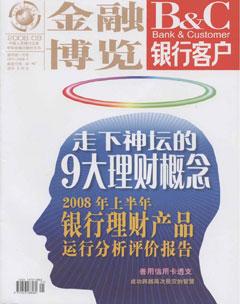英语角
The world must repel calls to contain
competitive markets
The surprise of recent months is not that global economic growth is slowing, but that there is any growth at all. The credit crunch of the past year has not followed the path of recent economically debilitating episodes characterised by a temporary freezing up of liquidity come to mind. This crisis is different - a once or twice a century event deeply rooted in fears of insolvency of major financial institutions.
This crisis was not brought to closure by the worlds central banks injection of huge doses of short-term liquidity. Only when sovereign credits were substituted for private bank credit, first in the case of the UK (Northern Rock) and subsequently in the case of the US (Bear Stearns), was a semblance of stability restored to markets. But the London Interbank Offered Rate spreads on overnight index swaps and credit default swaps of financial institutions have not returned to the modest pre-crisis levels.
The insolvency crisis will come to an end only as home prices in the US begin to stabilise and clarify the level of equity in homes.
Pending that outcome, the price of equities worldwide will determine whether the international financial system can maintain a modicum of stability as it eases out of its credit crunch, or falls back into another period of angst and turmoil.
A sustained level of global equity prices will be critical if banks are to recapitalise themselves at the higher levels daunted investors now require. The pool of capital is being augmented by a reasonably high level of saving (nearly 24 per cent of world gross domestic product), up significantly from earlier this decade. The flow of new saving will provide some support.
Capital gains, however, are just as important. If, for whatever reason, discounting of prospective future earnings engendered by the worlds physical capital stock declines, the market value of that capital stock rises with no offsetting liability. There is accordingly a larger value of equity shoring up the capital of financial or nonfinancial businesses. Should that discount rate reverse, the value of world equity will fall. Consequently, lower global stock prices could impede the recapitalisation of banks and other financial institutions. Debt issuance would also be suppressed as it leverages off the level of equity.
A financial crisis is heralded, in fact defined, by sharp discontinuities of asset prices. The crisis must thus be unanticipated. The fact that risk was heavily underpriced for much of this decade was broadly recognised in the financial community, but the timing of the sharp price correction was nonetheless a surprise.
When the current crisis emerged, it was assumed that the weak links would be unregulated hedge and private funds. The losses, however, have been predominately in the most heavily regulated institutions-banks.
The remarkably strong performance of the world economy since the near universal adoption of market capitalism is testament to the benefits of increasing economic flexibility.
It has become hard for democratic societies accustomed to prosperity to see it as anything other than the result of their deft political management. In reality, the past decade has seen mounting global forces(the international version of Adam Smiths invisible hand)quietly displacing governmentcontrol of economic affairs. The danger is that some governments, bedevilled by emerging inflationary forces, will endeavour to reassert their grip on economic affairs. If that becomes widespread, globalisation could reverse-at awesome cost.
The Fourth Element
Teacher: What are the four element of nature?
Student: Fire, air, earth, and...
Teacher: And what? Just think it over. What do you wash your hands with?
Student: Soap!

